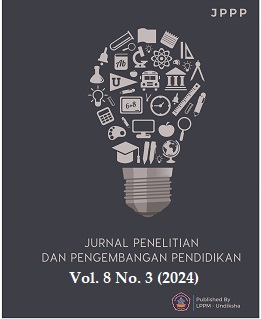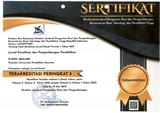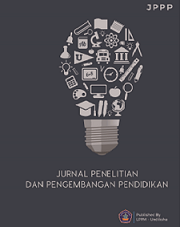Self-Directed Learning Based Teaching Module on Angle Material
DOI:
https://doi.org/10.23887/jppp.v8i3.62123Keywords:
Self Directed Learning Model, Teaching Module, Independent Curriculum, CornerAbstract
The change of curriculum to an independent curriculum was motivated by the backwardness of learning. In its implementation, the independent curriculum is not based on the concept set by the government. Teaching modules need to be developed so that they can be used to facilitate teachers and students. This research is a development research (R&D). This study aims to develop a self-directed learning (SDL) teaching module and test the feasibility of the SDL teaching module. In developing the teaching module, the researcher used the 4D research model. Data collection used documentation, observation, unstructured interviews and questionnaires. Data analysis used quantitative descriptive analysis techniques. Based on the research that has been done, the researcher produced an SDL teaching module. The modified 4D model development process developed the process of developing the teaching module. The developed teaching module was categorized as very suitable for use in learning and has been proven theoretically and empirically. The SDL teaching module that has been developed can facilitate teachers and students in implementing learning that is in line with the concept of the independent curriculum.
References
Aisyah, L., Rizqiqa, F. N. R., Putri, F. D., & Nulhaq, S. (2022). Kurikulum Merdeka dalam Perspektif Pemikiran Pendidikan Paulo Freire. At-Ta’lim: Jurnal Pendidikan, 8(2). https://doi.org/10.55210/attalim.v8i2.819.
Aman, Uliyanti, E., & Syamsiati. (2021). Peningkatan Hasil Belajar Siswa Menggunakan Metode Drill Pada Pembelajaran Matematika Di Sekolah Dasar. Journal for Lesson and Learning Studies, 4, 297–301. https://doi.org/10.26418/jppk.v4i12.12880.
Ardianti, Y., & Amalia, N. (2022). Kurikulum Merdeka: Pemaknaan Merdeka dalam Perencanaan Pembelajaran di Sekolah Dasar. Jurnal Penelitian Dan Pengembangan Pendidikan, 6(3), 399–407. https://doi.org/10.23887/jppp.v6i3.55749.
Baharuddin, R. A., Rosyida, F., Irawan, L. Y., & Utomo, D. H. (2022). Model pembelajaran self-directed learning berbantuan website notion: meningkatkan kemampuan berpikit kritis siswa SMA. Jurnal Inovasi Teknologi Pendidikan, 9(3), 245–257. https://doi.org/10.21831/jitp.v9i3.52017.
Daga, A. T. (2020). Kebijakan Pengembangan Kurikulum di Sekolah Dasar (Sebuah Tinjauan Kurikulum 2006 hingga Kebijakan Merdeka Belajar). Jurnal Edukasi Sumba (JES), 4(2), 103–110. https://doi.org/10.53395/jes.v4i2.179.
Daga, A. T. (2021). Makna Merdeka Belajar dan Penguatan Peran Guru di Sekolah Dasar. Jurnal Educatio FKIP UNMA, 7(3), 1075–1090. https://doi.org/10.31949/educatio.v7i3.1279.
Dewi Anggelia, Ika Puspitasari, & Shokhibul Arifin. (2022). Penerapan Model Project-based Learning ditinjau dari Kurikulum Merdeka dalam Mengembangkan Kreativitas Belajar Pendidikan Agama Islam. Jurnal Pendidikan Agama Islam Al-Thariqah, 7(2), 398–408. https://doi.org/10.25299/al-thariqah.2022.vol7(2).11377.
Fajri, Z. (2019). Model Pembelajaran Discovery Learning Dalam Meningkatkan Prestasi Belajar Siswa Sd. Jurnal IKA PGSD (Ikatan Alumni PGSD) UNARS, 7(2), 1. https://doi.org/10.36841/pgsdunars.v7i2.478.
Fauzi, A. (2022). Implementasi Kurikulum Merdeka Di Sekolah Penggerak. Pahlawan: Jurnal Pendidikan-Sosial-Budaya, 18(2), 18–22. https://doi.org/10.57216/pah.v18i2.480.
Gresita, A., & Panduwinata, L. F. (2022). Pengaruh ICT Literacy Dan Self Directed Learning Terhadap Kemandirian Belajar Mahasiswa Prodi PAP Unesa Di Era Normal. JPEK (Jurnal Pendidikan Ekonomi Dan Kewirausahaan), 6(1), 1–11. https://doi.org/10.29408/jpek.v6i1.5464.
Gusteti, M. U., & Neviyarni. (2022). Pembelajaran Berdiferensiasi Pada Pembelajaran Matematika Di Kurikulum Merdeka. Jurnal Lebesgue : Jurnal Ilmiah Pendidikan Matematika, Matematika Dan Statistika, 3(3), 636–646. https://doi.org/10.46306/lb.v3i3.180.
Hanik, E. U. (2020). Self Directed Learning Berbasis Literasi Digital Pada Masa Pandemi Covid-19 Di Madrasah Ibtidaiyah. ELEMENTARY: Islamic Teacher Journal, 8(1), 184–207. https://doi.org/10.21043/elementary.v8i1.7417.
Hartoyo, A., & Rahmadayanti, D. (2022). Potret Kurikulum Merdeka, Wujud Merdeka Belajar di Sekolah Dasar. Jurnal Basicedu, 5(4), 2247–2255. https://doi.org/10.31004/basicedu.v6i4.3431.
Indarta, Y., Jalinus, N., Waskito, W., Samala, A. D., Riyanda, A. R., & Adi, N. H. (2022). Relevansi Kurikulum Merdeka Belajar dengan Model Pembelajaran Abad 21 dalam Perkembangan Era Society 5.0. Edukatif: Jurnal Ilmu Pendidikan, 4(2). https://doi.org/10.31004/edukatif.v4i2.2589.
Indarta, Yose, Jalinus, N., Waskito, W., Samala, A. D., Riyanda, A. R., & Adi, N. H. (2022). Relevansi Kurikulum Merdeka Belajar dengan Model Pembelajaran Abad 21 dalam Perkembangan Era Society 5.0. Edukatif : Jurnal Ilmu Pendidikan, 4(2), 3011–3024. https://doi.org/10.31004/EDUKATIF.V4I2.2589.
Jufriadi, A., Huda, C., Aji, S. D., Pratiwi, H. Y., & Ayu, H. D. (2022). Analisis Keterampilan Abad 21 Melalui Implementasi Kurikulum Merdeka Belajar Kampus Merdeka. Jurnal Pendidikan Dan Kebudayaan, 7(1), 39 – 53. https://doi.org/10.24832/jpnk.v7i1.2482.
Jusuf, H., & Sobari, A. (2022). Pembelajaran Paradigma Baru Kurikulum Merdeka Pada Sekolah Dasar. Jurnal Pengabdian Kepada Masyarakat UBJ, 5(2), 185–194. https://doi.org/10.31599/jabdimas.v5i2.1360.
Kahfi, A. (2022). Implementasi Profil Pelajar Pancasila dan Implikasinya terhadap Karakter Siswa di Sekolah. DIRASAH: Jurnal Pemikiran Dan Pendidikan Dasar Islam, 5(2), 138-151. https://doi.org/10.51476/dirasah.v5i2.402.
Karatas, K., & Arpaci, I. (2021). The role of self-directed learning, metacognition, and 21st century skills predicting the readiness for online learning. Contemporary Educational Technology, 13(3). https://doi.org/10.30935/cedtech/10786.
Khotimah, N. (2020). Penerapan Metode Drill Untuk Meningkatkan Keterampilan Passing Atas Bola Voli Siswa Smpn 4 Tapung Hilir. JETE:Journal of Education and Teaching, 1(1). https://doi.org/0.24014/jete.v1i1.7895.
Kusmaharti, D., & Yustitia, V. (2022). Self-regulated learning-based digital module development to improve students’ critical thinking skills. Al-Jabar : Jurnal Pendidikan Matematika, 13(1), 211–220. https://doi.org/10.24042/ajpm.v13i1.12756.
Mentz, E., & Lubbe, A. (2021). Learning through assessment: An approach towards Self-Directed Learning (Vol. 7). Cape Town. https://doi.org/10.4102/aosis.2021.BK280.
Ningrum, A. R., & Suryani, Y. (2022). Peran Guru Penggerak dalam Kurikulum Merdeka Belajar. AR-RIAYAH : Jurnal Pendidikan Dasar, 6(2), 219. https://doi.org/10.29240/jpd.v6i2.5432.
Prasasti Abrar, A. I., Salam, A. N., & Suharti, S. (2021). Pengembangan Perangkat Pembelajaran Mata Kuliah Aljabar Linear Elementer Berbasis Pendekatan Saintifik yang Terintegrasi dengan Karakter Islami. Jurnal Cendekia : Jurnal Pendidikan Matematika, 6(1), 120–132. https://doi.org/10.31004/cendekia.v6i1.1025.
Rahayu, R., Rosita, R., Rahayuningsih, Y. S., Hernawan, A. H., & Prihantini, P. (2022). Implementasi Kurikulum Merdeka Belajar di Sekolah Penggerak. Jurnal Basicedu, 6(4), 6313–6319. https://doi.org/10.31004/basicedu.v6i4.3237.
Ramadhan, A., Jalinus, N., Ta’ali, T., & Mulianti, M. (2021). Pengembangan Modul Elektronik Berbasis Model Pembelajaran Self Directed Learning pada Mata Pelajaran Pengelasan. JINOTEP (Jurnal Inovasi Dan Teknologi Pembelajaran): Kajian Dan Riset Dalam Teknologi Pembelajaran, 8(1), 91–100. https://doi.org/10.17977/um031v8i12021p091.
Ramadhan, D. A., & Muhroji. (2022). Peran Guru dalam Meningkatkan Motivasi Belajar pada Peserta Didik di Sekolah Dasar. JURNAL BASICEDU, 6(3), 4855–4861. https://doi.org/10.31004/basicedu.v6i3.2960.
Rasmawan, R., & Erlina, E. (2021). Pengembangan Aplikasi E-Book Elektrokimia Berbasis Android Untuk Menumbuhkan Self-Directed Learning Mahasiswa. Jurnal Pendidikan Sains Indonesia, 9(3), 346–362. https://doi.org/10.24815/jpsi.v9i3.20072.
Rosmana, P. S., Iskandar, S., Fauziah, H., Azzifah, N., & Khamelia, W. (2022). Kebebasan dalam Kurikulum Prototype. As-Sabiqun, 4(1), 115–131. https://doi.org/10.36088/assabiqun.v4i1.1683.
Rudianto, E., Wulandari, P. C., & Yuliati, L. (2021). Pemberdayaan Modul Digital Interaktif Pembelajaran Daring dan Praktikum Fisika Berbasis Self-Directed Learning ( SDL ) di SMAN 1 Turen. Jurnal MIPA Dan Pembelajarannya, 0634(4). https://doi.org/10.17977/um067vXiXpXXX-XXX.
Santoso, G., Damayanti, A., Murod, M., & Imawati, S. (2023). Implementasi Kurikulum Merdeka melalui Literasi Proyek Penguatan Profil Pelajar Pancasila. Jurnal Pendidikan Transformatif (Jupetra), 02(01), 84–90. https://doi.org/10.9000/jupetra.v2i1.127.
Sari, F. I., Sunedar, D., & Anshori, D. (2022). Analisa Perbedaan Kurikulum 2013 dan Kurikulum Merdeka. Jurnal Pendidikan Dan Konseling, Vol. 5(1), 146–151. https://doi.org/10.31004/jpdk.v5i1.10843.
Sopiansyah, D., Masruroh, S., Zaqiah, Q. Y., & Erihadiana, M. . (2022). Konsep dan Implementasi Kurikulum MBKM (Merdeka Belajar Kampus Merdeka ). Religion Education Social Laa Roiba Journal (RESLAJ), 4(1), 34–41. https://doi.org/10247476/reslaj.v4i1.458.
Wahyuningsari, D., Mujiwati, Y., Hilmiyah, L., Kusumawardani, F., & Sari, I. P. (2022). Pembelajaran Berdiferensiasi Dalam Rangka Mewujudkan Merdeka Belajar. Jurnal Jendela Pendidikan, 2(04), 529–535. https://doi.org/10.57008/jjp.v2i04.301.
Warsidah, W., Satyahadewi, N., Amir, A., Linda, R., & Mulya Ashari, A. (2022). Implementasi Pembelajaran Berbasis Kurikulum Merdeka pada Peserta Didik Kelas 4 Sekolah Dasar Negeri No 16 Pontianak Utara. AR-RIAYAH : Jurnal Pendidikan Dasar, 6(2), 233. https://doi.org/10.29240/jpd.v6i2.5519.
Waskito, K. L., Subandowo, M., & Rusmawati, R. D. (2020). Pengembangan modul hybrid termodinamika berbasis Self Directed Learning (SDL) bagi pelaut. Jurnal Inovasi Teknologi Pendidikan, 7(1), 67–77. https://doi.org/10.21831/jitp.v7i1.32168.
Wasyilah, W., Yusrizal, Y., & Ilyas, S. (2021). Application of Self Directed Learning Model to Improve Student’s Independence and Critical Thinking Skills. Jurnal Penelitian Pendidikan IPA, 7(4), 651–659. https://doi.org/10.29303/jppipa.v7i4.784.
Yamin, M., & Syahrir, S. (2020). Pembangunan Pendidikan Merdeka Belajar (Telaah Metode Pembelajaran). Jurnal Ilmiah Mandala Education, 6(1), 126–136. https://doi.org/10.36312/jime.v6i1.1121.
Zahir, A., Nasser, R., Supriadi, S., & Jusrianto, J. (2022). Implementasi kurikulum merdeka jenjang SD kabupaten luwu timur. Jurnal Ilmu Pengetahuan Dan Teknologi Bagi Masyarakat, 2(2), 1–8. https://doi.org/10.54065/ipmas.2.2.2022.228.
Downloads
Published
How to Cite
Issue
Section
License
Copyright (c) 2024 Eldine Salsabila Putri, Dian Kusmaharti, Via Yustitia

This work is licensed under a Creative Commons Attribution-ShareAlike 4.0 International License.
Authors who publish with the Jurnal Penelitian dan Pengembangan Pendidikan agree to the following terms:
- Authors retain copyright and grant the journal the right of first publication with the work simultaneously licensed under a Creative Commons Attribution License (CC BY-SA 4.0) that allows others to share the work with an acknowledgment of the work's authorship and initial publication in this journal.
- Authors are able to enter into separate, additional contractual arrangements for the non-exclusive distribution of the journal's published version of the work (e.g., post it to an institutional repository or publish it in a book), with an acknowledgment of its initial publication in this journal.
- Authors are permitted and encouraged to post their work online (e.g., in institutional repositories or on their website) prior to and during the submission process, as it can lead to productive exchanges, as well as earlier and greater citation of published work. (See The Effect of Open Access)








